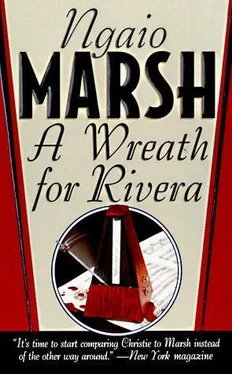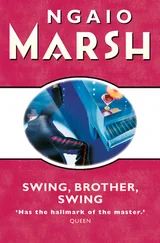He crashed his cymbal, silenced it and leant back in his seat.
Rivera had advanced in the spot light. The rest of the band was tacit. The great motionless arm of the metronome stabbed its pointer down at his head. He seemed rapt — at once tormented and exalted. He swayed and jerked and ogled. Although he was not by any means ridiculous, he was the puppet of his own music. The performance was a protracted crescendo, and as it rocketed up to its climax he swayed backwards at a preposterous angle, his instrument raised, the pointer menacing it as it undulated across his chest. A screaming dissonance tore loose from the general din, the spot light switched abruptly to the tympani. Lord Pastern, wearing his sombrero, had risen. Advancing to within five feet of Rivera he pointed his revolver at him and fired.
The accordion blared grotesquely down a scale. Rivera sagged at the knees and fell. The accordion crashed a final chord and was silent.
At the same moment as the shot was fired the tenor saxophonist played a single shrill note and sat down. Lord Pastern, apparently bewildered, looked from the recumbent Rivera to the saxophonist, paused for a second and then fired three more blanks. The pianist, the trombone, and finally the double-bass each played a note in a descending scale and each imitated a collapse.
There was a further second’s pause. Lord Pastern, looking very much taken-aback, suddenly handed the revolver to Bellairs, who pointed it at him and pulled the trigger. The hammer clicked but there was no discharge. Bellairs aped disgust, shrugged his shoulders, looked at the revolver and broke it open. It discharged its shells in a little spurt. Breezy scratched his head, dropped the revolver in his pocket and made a crisp gesture with his baton hand.
“Yipes,” Lord Pastern shouted. The band launched itself into a welter of noise. He darted back and flung himself at his tympani. The spot light concentrated upon him. The metronome, which had been motionless until now, suddenly swung its long arm. Tick-tack, tick-tack, it clacked. A kaleidoscopic welter of coloured lights winked and flickered along its surface and frame. Lord Pastern went madly to work on the drums.
“Hell!” Edward ejaculated. “At this pace he’ll kill himself.”
Breezy Bellairs had got a large artificial wreath. Dabbing his eyes with his handkerchief he knelt by Rivera, placed the wreath on his chest and felt his heart. He bent his head, groped frantically inside the wreath and then looked up with a startled expression in the direction of the tympani, where the spot light revealed Lord Pastern in an ecstatic fury, wading into his drums. His solo lasted about eighty seconds. During this time four waiters had come in with a stretcher. Bellairs spoke to them excitedly. Rivera was carried off while the saxophones made a grotesque lugubrious sobbing and Lord Pastern, by hitting his big drum and immediately releasing the tension, produced a series of muffled groans.
The metronome clacked to a standstill, the restaurant lights went up and the audience applauded generously. Breezy, white to the lips and trembling, indicated Lord Pastern, who joined him, glistening with sweat, and bowed. Breezy said something inaudible to him and to the pianist and went out, followed by Lord Pastern. The pianist, the double-bass and the three saxophonists began to play a dance tune.
“Good old George!” cried Félicité. “I think he was superb, Maman darling, don’t you? Ned, wasn’t he heaven?”
Edward smiled at her. “He’s astonishing,” he said, and added: “Cousin G, do you mind if Lisle and I dance? You will, won’t you, Lisle?”
Carlisle put her hand on his shoulder and they moved away. The headwaiter slid past them and stooped for a moment over a man at a table further down the room. The man rose, let his eyeglass fall and, with a preoccupied look, passed Carlisle and Edward on his way to the vestibule.
They danced in silence, companionably. At last Edward said: “What will he do next, do you suppose? Is there anything left?”
“I thought it dreadfully pathetic.”
“Quintessence of foolery. Lisle, I haven’t had a chance to talk to you about that business before we left. I suppose I oughtn’t to have hit the fellow, considering the set-up with Fée, but really it was a bit too much. I’m sorry if I made an unnecessary scene, but I must say I enjoyed it.” When she didn’t answer, he said uncertainly: “Are you seriously annoyed? Lisle, you didn’t by any chance…”
“No,” she said. “No, I didn’t. I may as well confess I was extremely gratified.” His hand tightened on hers. “I stood,” she added, “in the door of my cave and preened myself.”
“Did you notice his ear? Not a cauliflower, but distinctly puffy, and a little trickle of blood. And then the unspeakable creature had the infernal nerve to goggle at you over his hurdy-gurdy.”
“It’s all just meant to be one in the eye for Fée.”
“I’m not so sure.”
“If it is, he’s not having much success.”
“How do you mean?” Edward asked sharply.
“Arst yerself, dearie.”
“You mean Fée…” He stopped short and turned very red. “Lisle,” he said, “about Fée… Something very odd has occurred. It’s astonishing, and, well, it’s damned awkward. I can’t explain but I’d like to think you understood.”
Carlisle looked up at him. “You’re not very lucid,” she said.
“Lisle, my dear… Lisle, see here…”
They had danced round to the band dais. Carlisle said: “Our waiter’s standing over there, watching us. I think he’s trying to catch your eye.”
“Be blowed to him.”
“Yes, he is. Here he comes.”
“It’ll be some blasted paper on my tracks. Yes, do you want me?”
The waiter had touched Edward’s arm. “Excuse me, sir. An urgent call.”
“Thank you. Come with me, Lisle. Where’s the telephone?”
The waiter hesitated, glanced at Carlisle and said: “If madam will excuse me, sir…” His voice sank to a murmur.
“Good Lord!” Edward said and took Carlisle by the elbow. “There’s been some sort of trouble. Cousin George wants me to go in. I’ll drop you at the table, Lisle.”
“What’s he up to now, for pity’s sake?”
“I’ll come as soon as I can. Make my excuses.”
As he went out Carlisle saw, with astonishment, that he was very pale.
In the vestibule, which was almost deserted, Edward stopped the waiter. “How bad is it?” he asked. “Is he badly hurt?”
The man raised his clasped hands in front of his mouth. “They say he’s dead,” said the waiter.
Breezy Bellairs sat at the little table in the inner office where he had played poker. When Edward came through the outer office he had heard scuffling and expostulations and he had opened the door upon a violent struggle. Breezy was being lugged to his feet from a squatting position on the floor and hustled across the room. He was slack, now, and unresisting. His soft hands scratched at the surface of the table. He was dishevelled and breathless; tears ran out of his eyes, and his mouth was open. David Hahn, the secretary, stood behind him and patted his shoulder. “You shouldn’t have done it, old boy,” he said. “Honest. You shouldn’t have done a thing like that.”
“Keep off me,” Breezy whispered. Caesar Bonn, wringing his hands in the conventional gesture of distress, looked past Edward into the main office. The man with the eyeglass sat at the desk there, speaking inaudibly into the telephone.
“How did it happen?” Edward asked.
“Look,” Lord Pastern said.
Edward crossed the room. “You must not touch him,” Caesar Bonn gabbled. “Excuse me, sir, forgive me. Dr. Allington has said at once, he must not be touched.”
Читать дальше






